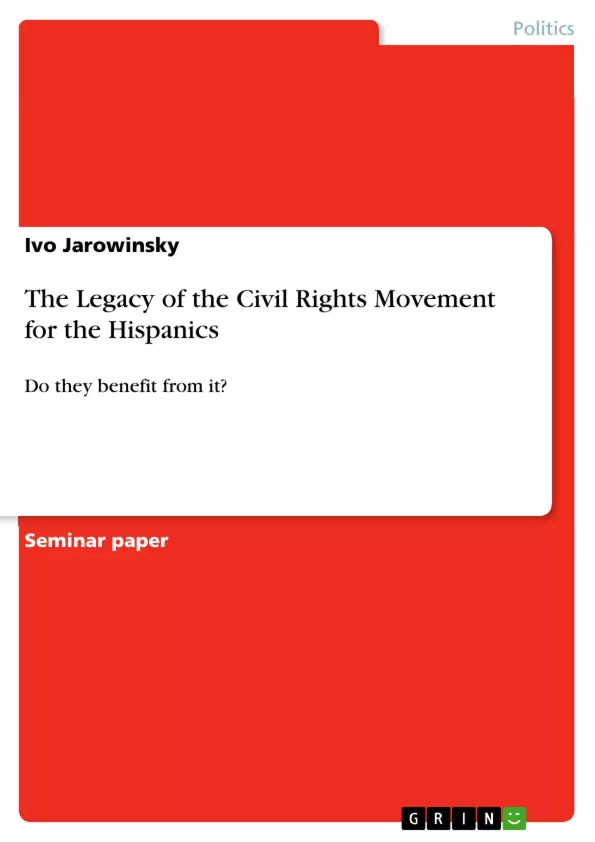The latest effort of the U.S. Congress to pass a new immigration law to reduce illegal
immigration have caused numerous protest above all by Hispanic People who on the one hand
have become the largest ethnic minority in the meantime but on the other time make up the
largest number of illegal immigrants to the U.S. They feel threatened by the prospects of
being criminalized for only trying to make a better living by temporarily working in the U.S. hired by American Companies searching for cheap employees. But they have ignored the
laws, as conservative politicians justified the need of a new bill. This is one of the
most important factors why some Hispanics now feel the time has come to stand up and
march for more equal rights in a country where they provide substantial contributions to the
economic growth and apparently nobody cares about their legal status. But the federal authorities describe them as criminals. Some of the affected people won’t accept these developments any more and are keen to stop these attempts to destroy all they worked hard for. This recalls the actions the Black People undertook between 1955 and 1970 to assure the
acknowledgement of their American citizenship as it was considered in the constitution in some way.
Can this be the beginning of a new so-called social movement as political scientists put it? Or ist just a try of interested observers and participators to exaggerate the impact of a ethnic minority group on political developments happening in Washington, D.C to prevent them from thinking they are not welcome in the U.S. and so on?
This will be discussed in the presented paper to be able to find a satisfying answer to the question whether or not the long shadow of the Civil Rights Movement helps the Hispanic Commnunity in the US to change its situation profoundly.
Inhaltsverzeichnis (Table of Contents)
- A. Introduction
- B. Main part
- 1. The (imputed) Role Model
- 2. Hispanic Efforts in the Past
- 3. The Booster for a new Movement/Action Group
- 4. Coalition or Competition?
- 5. The Meaning of the Hispanics for the U.S.
- 6. Different Types of Immigration
- 7. A new civil rights movement on the national political scene?
- C. Conclusion
Zielsetzung und Themenschwerpunkte (Objectives and Key Themes)
This paper analyzes whether recent protests by Hispanic Americans, particularly concerning immigration law, represent the beginnings of a new civil rights movement. It examines whether the successes of the Black Civil Rights Movement serve as a model for Hispanic activism and explores the historical context of Hispanic political mobilization in the United States.
- The potential emergence of a new Hispanic civil rights movement.
- The role of the Black Civil Rights Movement as a model for Hispanic activism.
- Historical overview of Hispanic political mobilization in the US.
- Analysis of the characteristics and organizational structures of Hispanic activist groups.
- The impact of immigration policies on Hispanic mobilization.
Zusammenfassung der Kapitel (Chapter Summaries)
A. Introduction: This section introduces the context of the paper, highlighting recent protests by Hispanic Americans against new immigration laws and posing the central question: Does this represent a new civil rights movement? It draws parallels to the Black Civil Rights Movement and outlines the paper's objective.
B. Main part: This section is divided into several sub-chapters. Chapter 1 analyzes the Black Civil Rights Movement as a potential model, contrasting its goals with the situation of Hispanic immigrants. Chapter 2 discusses past Hispanic efforts towards political mobilization, including the Community Service Organization (CSO) and Cesar Chavez's work. The remaining chapters (3-7) will further explore the potential for a new movement and the relevant social, political, and economic factors.
Schlüsselwörter (Keywords)
Hispanic Americans, Civil Rights Movement, Immigration, Political Mobilization, Social Movements, Cesar Chavez, Community Service Organization (CSO), La Huelga.
Frequently Asked Questions
Is there a new civil rights movement among Hispanics in the US?
The paper analyzes recent protests against immigration laws to determine if they signal the start of a major social movement similar to the one in the 1960s.
How does the Black Civil Rights Movement serve as a model?
Hispanic activists often draw inspiration from the strategies and successes of the Black Civil Rights Movement (1955-1970) to fight for equal rights and citizenship recognition.
What role did Cesar Chavez play in Hispanic mobilization?
Cesar Chavez was a key figure in organizing farmworkers and promoting political awareness through organizations like the Community Service Organization (CSO).
How do immigration laws affect Hispanic activism?
New, stricter immigration laws often criminalize workers, pushing the Hispanic community to march for rights and economic recognition.
What is the economic significance of Hispanics in the US?
The paper highlights that Hispanics provide substantial contributions to the US economic growth, which fuels their demand for legal status and equal treatment.
- Quote paper
- Ivo Jarowinsky (Author), 2006, The Legacy of the Civil Rights Movement for the Hispanics, Munich, GRIN Verlag, https://www.grin.com/document/123028



